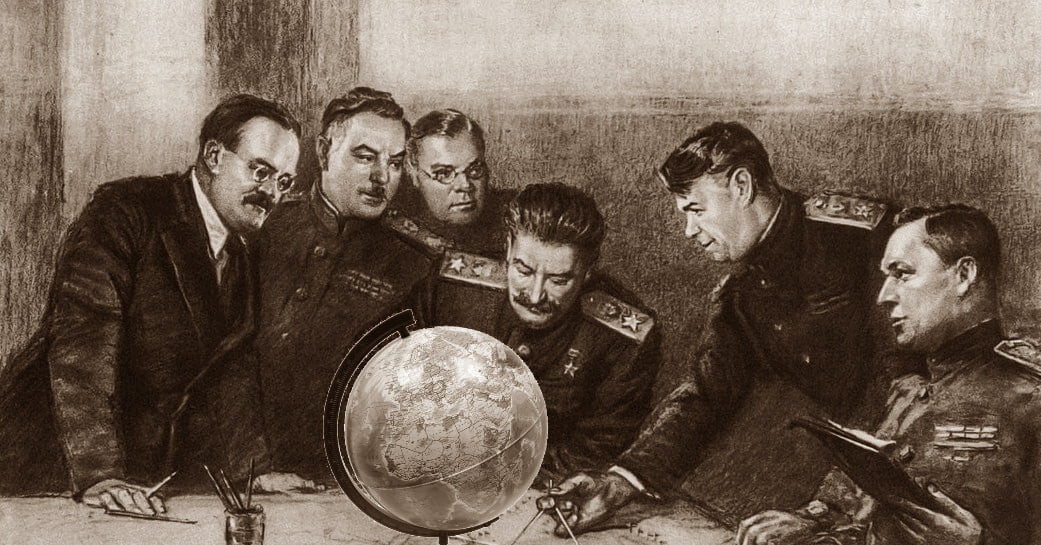According to popular belief, the Soviet leader, due to his illiteracy, directed the actions of the fronts not through the maps of the General Staff, but through an ordinary globe. We checked if this is true.
The most famous source of this information is Nikita Khrushchev’s secret report “On the Cult of Personality and Its Consequences,” read out at the 20th Congress of the CPSU on February 25, 1956. Criticizing Stalin's actions during the Great Patriotic War, Khrushchev remembered:
“Take,” I say, “the map, Alexander Mikhailovich (Comrade Vasilevsky is present here), show Comrade Stalin what the situation is. But it must be said that Stalin planned the operations around the globe. (Animation in the hall.) Yes, comrades, he will take a globe and show the front line on it. So, I tell Comrade Vasilevsky, show the situation on the map, because under these conditions it is impossible to continue the previously planned operation. For the benefit of the matter, the old decision must be changed. INIt is impossible under these conditions to continue the previously planned operation.”
Despite the initial secrecy, later fragments of the report were published in the press (even American newspapers New York Times And Washington Post), and many of his provisions went to the people.
We will not consider the often raised question of Stalin’s competence in leading military operations - it requires a separate investigation and, to a large extent, a transition to the subjective plane. We are purely interested in the statement about the globe.
Criticizing Stalin for many methodological errors (especially in the initial phase of the war), Marshal Georgy Zhukov in his “Memoirs and Reflections” (1969) nevertheless notices:
“The version that has become widespread that the Supreme Commander-in-Chief studied the situation and made decisions on the globe does not correspond to reality. Of course, he didn’t work with tactical cards, and he didn’t need to. But he had a good understanding of operational maps with the situation marked on them.”
Marshal Alexander Vasilevsky, who served as Chief of the General Staff for almost three years (1942–1945) confirms this point of view:
“I completely agree with G.K. Zhukov regarding the ill-fated globe. He was not in J.V. Stalin’s office, he was in his rest room, and few people were invited there. Stalin always had working maps prepared by the General Staff for all directions and theaters of war that were needed.”
It is not very clear what prevented Vasilevsky from objecting to Khrushchev during the latter’s report, but the military leader’s memoirs appeared after the death of the former secretary general. More detailed information gives another marshal - Kirill Meretskov:
“...In some books we have a version that J.V. Stalin directed military operations “across the globe.” I have never read anything more ridiculous. During the war, being at headquarters and in the office of the Supreme Commander-in-Chief with reports, attending numerous meetings, I saw how matters were resolved. J.V. Stalin also turned to the globe, because he was faced with tasks of such a scale. But in general, he always worked with a map and when analyzing upcoming operations, sometimes, although not always, he even “minorized”. The latter seemed unnecessary to me. <…> I will not say that I always agreed with the way J.V. Stalin resolved issues, especially since we had to argue, as far as it was possible for me within the framework of subordination, both on small and large problems. But it is wrong to blame him for his lack of interest in details. This is simply not true. Even in strategic military matters, J.V. Stalin was not guided by a “global” orientation. It’s even more ridiculous to say this in relation to tactical issues, but they also interested him, and not a little.”
From memories another marshal - Alexander Golovanov:
“Stalin carefully examined the maps, and at the end of Zhukov’s report he pointed to a place on the map with his finger and asked:
- What is this?!
Georgy Konstantinovich bent over the map and, blushing slightly, answered:
— The officer who mapped the situation inaccurately mapped the defense line here. She passes here.
And he showed the exact location of the front line (on the map the defense line, apparently drawn in a hurry, partially ran through a swamp).
“It is advisable that people come here with accurate data,” Stalin noted.
For each of us it was an object lesson. So fight here “across the globe”!”
During the Great Patriotic War, General Sergey Shtemenko He was engaged in various staff work: he took part in assessing the situation on the fronts, prepared proposals for a report to the Supreme Commander-in-Chief, and from April 1943, as first deputy and then head of the Operations Directorate of the General Staff, he played an important role in planning the operations of the Soviet troops. This is what he would later write in his memoirs:
“Behind the end of the table, in the corner [of Stalin’s office], stood a large globe. I must note, however, that in hundreds of times I have visited this office, I have never seen it used when considering operational issues. Talk about directing the actions of the fronts around the globe is groundless.”
Thus, despite ambiguous assessments of Stalin’s role as Supreme Commander-in-Chief, major military leaders of the Second World War agree on one thing: the information disseminated by Khrushchev that the Soviet leader was planning operations on the globe is a fiction.
Fake
Read on the topic:
1. G.K.Zhukov. Memories and reflections.
2. A.M. Vasilevsky. Life's work.
If you find a spelling or grammatical error, please let us know by highlighting the error text and clicking Ctrl+Enter.







